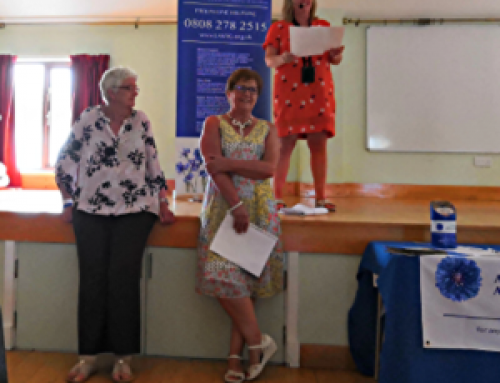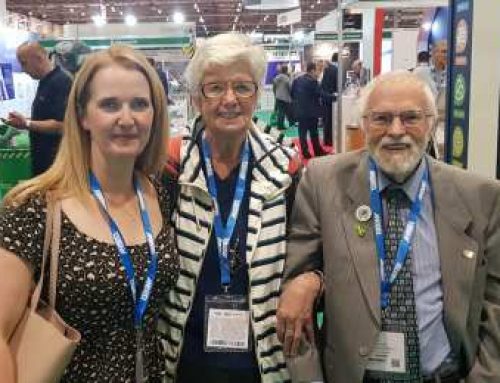Oh how I hated my alarm clock today as it went off at 4am. Dark and cold as the heating doesn’t come on at that time. I found my way to the shower and woke up as the water poured over me.
The dog would go with Ray; he seemed to be telling us it was inhuman to expect him to go walking at that time.
We got to the station and were soon speeding through the countryside to London on the fast train. We arrived at the Barbican Centre for 7.30am and walked down to the British Lung Foundation’s (BLF) office ready for our meeting, the Mesothelioma Patrons Breakfast. Everyone was so nice as we said all our hello’s.
Dr Penny Woods CEO opened the meeting and gave us the welcome, update and news. Nathen Bennet Policy and Public Affairs Officer was next to speak. He spoke about building and managing relationships with key stakeholders, including MPs, peers, and officials within the Department of Health, NHS England, Public Health England, NICE and other bodies.
Then it was my turn to talk and tell my story about what it’s like to have mesothelioma and the different treatments I have been through. I mentioned how pleased I was that we are having a Centre of Excellence and that at last money is coming through for funding research and trials of new drugs. I mentioned asbestos in schools and talked about the men that have the job of taking Asbestos out of the buildings and how they must be protected. We had a discussion and exchanged knowledge.
Ian Jarrold Head of Research at the BLF gave a good presentation about all that they have achieved so far. Ian has worked at the BLF for a decade. He has previously studied biochemistry and worked in the medical research charity sector.
Penny then closed the meeting and everyone found it interesting. Even Ray had a great time and managed to stay awake. We all shook hands and they had to go on to a working day. Bethany came and took us up to meet the Publicity team
We then left with Bethany and had a long chat with her at a lovely Café Meson Los Barriles. I enjoyed a latte
It was very sunny and very warm as we travelled home Ray fell asleep on the train bless!!!
https://statistics.blf.org.uk/mesothelioma
These statistics on mesothelioma in the UK were compiled as part of our Respiratory Health of the Nation project by teams at St George’s, University of London, Nottingham University and Imperial College London.
The disease information and research findings provided here refer only to mesothelioma of the chest, often called malignant pleural mesothelioma.
- Numbers of people with mesothelioma
- Ages of people with mesothelioma
- Mesothelioma registrations
- Deaths from mesothelioma
- Methodology
Numbers of people with mesothelioma
How many people in the UK have been diagnosed with mesothelioma?
Due to the short prognosis for mesothelioma, incidence and mortality data are more reliable than prevalence data in depicting trends.
However, in 2012, an estimated 5,400 people were living with mesothelioma in the UK.
Estimated numbers of people ever diagnosed with mesothelioma 2004–12
20042005200620072008200920102011201202,5005,0007,500
| YEAR | NUMBER OF PEOPLE IN THE UK WITH MESOTHELIOMA |
| 2004 | 5,039 |
| 2005 | 5,121 |
| 2006 | 5,396 |
| 2007 | 5,870 |
| 2008 | 5,822 |
| 2009 | 6,076 |
| 2010 | 6,401 |
| 2011 | 6,540 |
| 2012 | 5,419 |
2006: 5,400
How many males and females have mesothelioma in the UK?
Around 80% of mesothelioma cases occur in men. This reflects the greater likelihood of men having worked with asbestos in heavy industry or the armed forces.
In 2004–12, almost four times as many men as women had mesothelioma.
Number of males and females ever diagnosed with mesothelioma per 100,000, 2004–12
MaleFemale200420062008201020120246810121416
| YEAR | MALE | FEMALE |
| 2004 | 12 | 3 |
| 2005 | 12 | 3 |
| 2006 | 13 | 3 |
| 2007 | 14 | 3 |
| 2008 | 13 | 3 |
| 2009 | 14 | 3 |
| 2010 | 14 | 4 |
| 2011 | 14 | 4 |
| 2012 | 14 | 4 |
4
Ages of people with mesothelioma
How old are the people with mesothelioma in the UK?
Mesothelioma is mostly diagnosed in people aged over 70. However, over 20% of diagnoses are in people aged 51–60. The disease is rare in people under the age of 50.
Number of people per 100,000 ever diagnosed with mesothelioma, by age group, 2004–12
31 to 4041 to 5051 to 6061 to 7071 to 8081 and over200420062008201020120510152025303540455055
| YEAR | 31 TO 40 | 41 TO 50 | 51 TO 60 | 61 TO 70 | 71 TO 80 | 81 AND OVER |
| 2004 | 1 | 2 | 8 | 27 | 30 | 21 |
| 2005 | 0 | 2 | 10 | 25 | 32 | 20 |
| 2006 | 0 | 2 | 9 | 27 | 38 | 24 |
| 2007 | 0 | 1 | 10 | 28 | 40 | 29 |
| 2008 | 0 | 1 | 10 | 28 | 38 | 31 |
| 2009 | 0 | 1 | 10 | 26 | 42 | 30 |
| 2010 | 0 | 1 | 10 | 27 | 46 | 30 |
| 2011 | 0 | 1 | 8 | 29 | 40 | 40 |
| 2012 | 1 | 1 | 7 | 30 | 43 | 35 |
29
Mesothelioma registrations
How many people were registered as new cases of mesothelioma in the UK in 2011?
Cancer registration is the collection of population-based data on every new diagnosis of cancer (and mortality and survival from cancer) by a network of cancer registries across the UK. Data is collected on all patients whether they are treated in hospitals (acute, long stay, hospice or private) or by GPs. The Office for National Statistics collates the data to provide national figures annually.
According to the latest available cancer registration statistics, during 2011 there were 2,570 new cases of mesothelioma in the UK, an incidence rate of 2.8 per 100,000 persons. This is similar to the rate of new diagnoses estimated from GP statistics for recent years. However, GP statistics may underestimate the true incidence of cancer, because the diagnosis may be made in hospital during terminal illness, or post-mortem.
During 2011, 2,172 men and 398 women were registered as new cases of mesothelioma in the UK. These correspond to incidence rates of 5.2 per 100,000 for males and 0.8 per 100,000 for females.
How did rates of registration for mesothelioma vary across the UK in 2011?
England: There were higher rates of registration in the North East and South West compared with the UK generally. In Yorkshire and Humberside and the North East of England, male registration rates were higher than the rate for females. In other regions, notably the East Midlands, East of England, London and the South West of England, female registration rates were higher than the rates for males.
Scotland: There were lower rates of registration in Scotland compared with the UK generally, with a considerably higher registration rate for males compared with the rate for females.
Wales: The registration rate was lower compared with the UK generally, with the rate higher for females.
Northern Ireland: There were similar registration rates compared with the UK generally, with the rate for males lower.
Mesothelioma registration ratios, males and females, in each UK region, 2011
Age-standardised registration ratio (SRR) with 95% confidence intervalsMalesFemales050100150200North EastNorth WestYorkshire & HumbersideEast MidlandsWest MidlandsEast of EnglandLondonSouth EastSouth WestWalesScotlandNorthern IrelandUnited Kingdom
| REGION | MALES | FEMALES |
| North East | 155.8 | 137.5 |
| North West | 100 | 100 |
| Yorkshire & Humberside | 113.5 | 87.5 |
| East Midlands | 98.1 | 112.5 |
| West Midlands | 73.1 | 75 |
| East of England | 100 | 137.5 |
| London | 86.5 | 125 |
| South East | 115.4 | 112.5 |
| South West | 105.8 | 112.5 |
| Wales | 59.6 | 75 |
| Scotland | 92.3 | 50 |
| Northern Ireland | 88.5 | 100 |
| United Kingdom | 100 | 100 |
100 [100, 100]
Deaths from mesothelioma
How many people died from mesothelioma in the UK in 2012?
In 2012, 2,431 people in the UK died of mesothelioma. This marks an increase of 13% from 2008. The Health and Safety Executive publishes mesothelioma mortality rates every year. Its data show that the annual number of deaths is now over 2,500 and is continuing to rise.
However, mortality, like incidence, is expected to plateau and begin to decline towards the end of the decade.

We have to clearly keep on raising more interest in Research we have to help the Mesowarriors that will be diagnosed in the future because I don’t see the figures declining we need more education on the dangers of Asbestos before that happens. People still take chances with DIY and Schools. The lads that work with Asbestos removal and then the recycling and fly tipping are a disgrace and a danger.
We cant keep burying the problem But workshops like today bring people around the table and we learn from each other.
Today has been a good day.







Leave A Comment